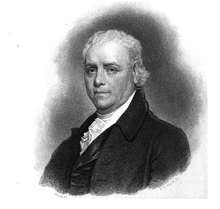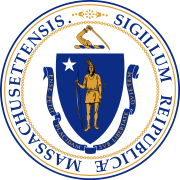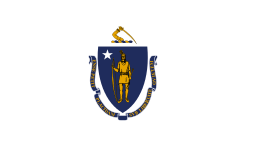David Cobb (Massachusetts)
| David Cobb | |
|---|---|
 | |
| 8th Lieutenant Governor of Massachusetts | |
|
In office 1809–1810 | |
| Governor | Christopher Gore |
| Preceded by | Levi Lincoln Sr. |
| Succeeded by | William Gray |
| Member of the U.S. House of Representatives from Massachusetts's At-large district | |
|
In office March 4, 1793 – March 3, 1795 | |
| Preceded by | Seat created |
| Succeeded by | Seat eliminated |
| President of the Massachusetts Senate | |
|
In office 1801–1805 | |
| Preceded by | Samuel Phillips Jr. |
| Succeeded by | Harrison Gray Otis |
| Speaker of the Massachusetts House of Representatives[1] | |
|
In office May 1789[1] – January 1793[1] | |
| Preceded by | Theodore Sedgwick |
| Succeeded by | Edward Robbins |
| Member of the Massachusetts House of Representatives[1] | |
|
In office May 1789[1] – January 1793[1] | |
| Personal details | |
| Born |
September 14, 1748 Attleboro, Massachusetts |
| Died |
April 17, 1830 (aged 81) Taunton, Massachusetts |
| Political party | Federalist |
| Spouse(s) | Eleanor Bradish[2] |
| Relations | Robert Treat Paine, brother in law.[3] |
| Children |
Eleanor Bradish Cobb, b. March 23, 1767; d. October 30, 1842. Betsy Cobb, b. June 5, 1768. Thomas Cobb, b. June 29, 1772; d. October 27, 1849. William Gray Cobb, b. February 10, 1773; d. November 4, 1791. Eunice Cobb, b. November 17, 1774; d. June 6, 1826. Mary Cobb, b. July 26, 1776; d. October 17, 1851. David Cobb, b. April 3, 1778. Sally Cobb, b. January 15, 1780; d. age 17. Ebenezer Bradish Cobb, b. October 30, 1781; d. 1840. Henry Jackson Cobb, b. December 18, 1784; d. July 1848. David George Washington Cobb, January 14, 1790; February 27, 1832.[4] |
| Profession | Physician |
| Signature |
|
| Military service | |
| Allegiance |
|
| Service/branch | Continental Army, Massachusetts Militia |
| Years of service | 1776-1781, 1786 |
| Rank | lieutenant colonel, major general |
| Unit | 16th Massachusetts Regiment-Henry Jackson's regiment Massachusetts Militia, aide-de-camp on the staff of General George Washington |
| Commands | Fifth Division of the Massachusetts Militia[1] |
| Battles/wars | American Revolutionary War, New York and New Jersey campaign, Battle of Springfield, Battle of Monmouth. Battle of Rhode Island,[3] Shays' Rebellion |
David Cobb (September 14, 1748 – April 17, 1830) was a Massachusetts physician, military officer, jurist, and politician who served as a U.S. Congressman for Massachusetts's at-large congressional seat.
Biography
Born in Attleboro, Massachusetts, on September 14, 1748, Cobb graduated from Harvard College in 1766. He studied medicine in Boston and afterward practiced in Taunton, Massachusetts. He was a member of the Massachusetts Provincial Congress in 1775; lieutenant colonel of Jackson's regiment in 1777 and 1778, serving in Rhode Island and New Jersey; was aide-de-camp on the staff of General George Washington; appointed major general of militia in 1786 and rendered conspicuous service during Shays' Rebellion. He was a charter member of the American Academy of Arts and Sciences in 1780.[5]
Massachusetts Government
He served as a judge of the Bristol County Court of Common Pleas 1784–1796, and as a member of the State house of representatives 1789–1793, and the Massachusetts Senate, and served as Speaker of the Massachusetts House of Representatives and President of the Massachusetts Senate.
Congress
He was elected to the Third United States Congress (March 4, 1793 – March 3, 1795).
Maine
Cobb moved to Gouldsboro in the district of Maine in 1796 and engaged in agricultural pursuits; elected to the Massachusetts Senate from the eastern district of Maine in 1802 and served as president; elected to the Massachusetts Governor's Council in 1808; Lieutenant Governor of Massachusetts in 1809; member of the board of military defense in 1812; chief justice of the Hancock County (Maine) court of common pleas; returned in 1817 to Taunton, where he died on April 17, 1830. His remains were interred in Plain Cemetery.
Cobb was elected a member of the American Antiquarian Society in 1814.[6]
Legacy
In 1976, David Cobb was honored by being on a postage stamp for the United States Postal Service.
Notes
- 1 2 3 4 5 6 7 Porter, Joseph Whitcomb (July–August 1888), Bangor Historical Magazine Vol. IV Memoir of Gen. David Cobb and family of Gouldsborough, Maine, and Taunton, Mass, Bangor, Maine, p. 2
- ↑ Porter, p. 6.
- 1 2 The Daughters of Liberty (1904), Historical researches of Gouldsboro, Maine, Gouldsboro, Maine: The Daughters of Liberty, p. 22
- ↑ Porter, pp. 6–7.
- ↑ "Charter of Incorporation of the American Academy of Arts and Sciences". American Academy of Arts and Sciences. Retrieved July 28, 2014.
- ↑ American Antiquarian Society Members Directory
References
External links
- United States Congress. "David Cobb (id: C000545)". Biographical Directory of the United States Congress. Retrieved May 16, 2009.
- "David Cobb". Find a Grave. Retrieved May 16, 2009.
| Political offices | ||
|---|---|---|
| Preceded by [Data unknown/missing. You can help!] |
Member of the Massachusetts House of Representatives May 1789 – January 1793 |
Succeeded by [Data unknown/missing. You can help!] |
| Preceded by Theodore Sedgwick |
Speaker of the Massachusetts House of Representatives May 1789 – January 1793 |
Succeeded by Edward Robbins |
| United States House of Representatives | ||
| Preceded by Seat created |
Member of the U.S. House of Representatives from Massachusetts's at-large congressional seat March 4, 1793 – March 4, 1795 |
Succeeded by Seat eliminated |
| Political offices | ||
| Preceded by [Data unknown/missing. You can help!] |
Member of the Massachusetts State Senate 1801–1805 |
Succeeded by [Data unknown/missing. You can help!] |
| Preceded by Samuel Phillips Jr. |
President of the Massachusetts State Senate 1801–1805 |
Succeeded by Harrison Gray Otis |
| Preceded by Levi Lincoln Sr. |
Lieutenant Governor of Massachusetts 1809–1810 |
Succeeded by William Gray |


